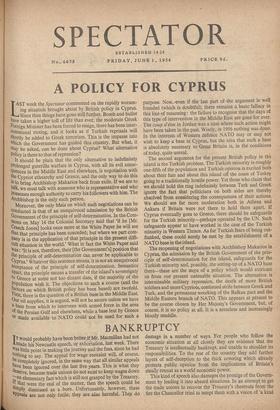A POLICY FOR CYPRUS
AST week the Spectator commented on the rapidly worsen- ing situation brought about by British policy in Cyprus.
Since then things have gone still further. Bomb and bullet have taken a higher toll of life than ever, the moderate Greek Foreign Minister has been forced to resign, there has been inter- communal rioting, and it looks as if Turkish reprisals will shortly be added to Greek terrorism. This is the impasse into which the Government has guided this country. But what, it may be asked, can be done about Cyprus? What alternative Policy is there to that of repression?
It should be plain that the only alternative to indefinitely Prolonged guerrilla warfare in Cyprus, with all its evil conse- quences in the Middle East and elsewhere, is negotiation with the Cypriot ethnarchy and Greece, and the only way to do this is to bring Archbishop Makarios back from exile. If we are to talk, we must talk with someone who is representative and who Possesses enough authority to carry his followers with him. The Archbishop is the only such person.
Moreover, the only basis on which such negotiations can be conducted is that of an unequivocal admission by the British Government of the principle of self-determination. In the Corn- !tons on May 14 the Colonial Secretary said that 'if he [Mr. Creech Jones] looks once more at the White Paper he will see that that principle has been conceded; but where we part com- Pally is in the application of that principle in the present diffi- cult situation in the world.' What in fact the White Paper said Was : 'It is not, therefore, their [the Government's] position that the principle of self-determination can never be applicable to CYPrus.' Whatever this sentence means, it is not an unequivocal acceptance of the principle of self-determination. Semantics apart, the principle means a transfer of the island's sovereignty to Greece at some not too distant date, if the majority of the Population wish it. The objections to such a course (and the ,factors on which British policy has been based) are twofold. First, there is the question of a British base in the Middle East. Our oil supplies, it is argued, will not be secure unless we have a base from which to intervene with armed force in the area of the Persian Gulf and elsewhere, while a base lent by Greece or made available to NATO could not be used for such a purpose. Now, .-even if the last part of -the argument is well founded (which is doubtful), there remains a basic fallacy in this line of reasoning : the failure to recognise that the days of this type of intervention in the Middle East are gone for ever. The coup d'etat in Jordan was a case where such action might have been taken in the past. Wisely, in 1956 nothing was done. In the interests of Western defence NATO may or may not wish to keep a base in Cyprus, but the idea that such a base is absolutely necessary to Great Britain is, in the conditions of today, quite unreal. The second argument for the present British policy in the island is the Turkish problem. The Turkish minority is roughly one-fifth of the population and Turkish opinion is excited both about their fate and about this island off the coast of Turkey going to a traditionally hostile power. Yet those who claim that we should hold the ring indefinitely between Turk and Greek ignore the fact that politicians on both sides are thereby absolved from considering the consequences of their actions. We should see far more moderation both in Athens and Ankara if Britain were not there to hold them apart. If Cyprus eventually goes to Greece, there should be safeguards for the Turkish minority—perhaps operated by the UN. Such safeguards appear to have worked in the case of the Turkish minority in Western Thrace. As for Turkish fears of being out- flanked, these could surely be met by the establishment of a NATO base in the island.
The reopening of negotiations with Archbishop Makarios in Cyprus, the admission by the British Government of the prin- ciple of self-determination for the island, safeguards for the Turkish minority and, possibly, the setting-up of a NATO base there—these are the steps of a policy which would extricate us from our present untenable situation. The alternative is interminable military repression, the death of more British soldiers and more Cypriots, continued strife between Greek and Turk, and the permanent wrecking of the Balkan pact and the Middle Eastern branch of NATO. This appears at present to be the course chosen by Her Majesty's Government, but, of course, it is no policy at all. It is a senseless and increasingly bloody muddle.


































 Previous page
Previous page